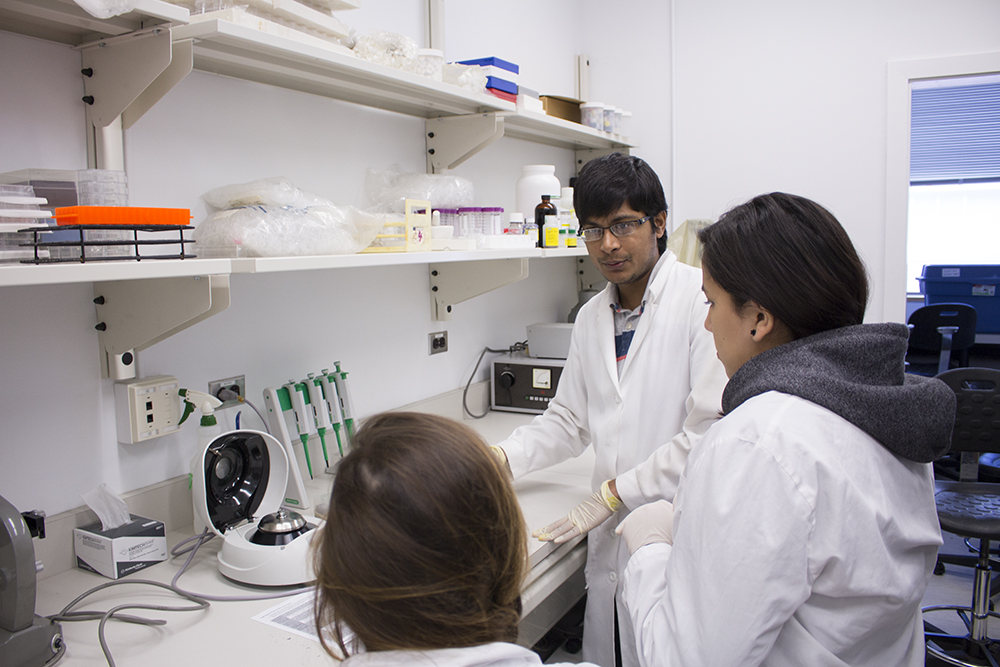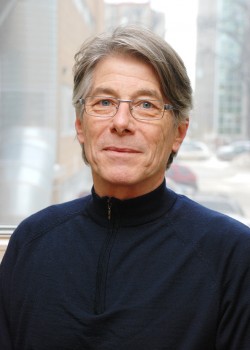
BYP’s new director a ‘good fit’
A community-minded Dentistry prof with a zeal for engaging inner-city youth in science, soccer and finding one’s passion has been named the new director of the Biomedical Youth Program (BYP).
Dr. James Gilchrist, professor of oral biology in the College of Dentistry, Faculty of Health Sciences, has invested over three decades pursuing research in heart and muscle adaptations to exercise and disease.
Gilchrist, who has been on the faculty at U of M for 22 years, was welcomed as the new director just over two weeks ago. The BYP was previously led by founding director Dr. Francis Amara, who had spent close to 10 years nurturing an incredible relationship with schools and kids in the community.
Be of service to others
The 62-year-old, born in Kent, England, moved frequently due to his dad’s job with the Royal Air Force. He went to seven different primary schools, one junior high school, two high schools, and lived in Australia for a period.
He says his life growing up was much more different than most of the kids he works with through inner-city initiatives. “I spent most of my time either swimming or just wandering off into the bush and playing make belief,” he recalls of his childhood.

Gilchrist, who has been on the faculty at U of M for 22 years, was recently appointed director of the BYP.
His father —who he says “lived an Indiana Jones kind of life”—was full of idioms that acted as guides to life, ones Gilchrist now passes on to his two kids.
“My father once commented to me on how it was back in those times in England; he said people considered it demeaning to be in a position of service but he always felt it was important that you do offer yourself and to give,” says Gilchrist.
For the last 15 years he has devoted his time to coaching soccer teams, the last five of those split between coaching and volunteer community work; on average he’s volunteering three to four nights a week.
“With my kids I felt it was always important for me to set an example, so I would do volunteer work with them; I would take my daughter down to Winnipeg Harvest when she had to do her rotations (for school), we’d have a dialogue about what this meant and why we’re doing it,” he says.
A good fit
Gilchrist recalls a conversation he had with his eldest child. His 21-year-old son had approached him about what his next steps in life should be. “I told to him, it doesn’t matter what you do, just try and make sure it fits well with you. There are two moments in my life when things fit, the first when I went to do my undergrad. That fit. The second that fits is this job, particularly this positon of working with the BYP.”
He earned an undergraduate degree in sport science training in Liverpool, U.K., and went on to obtain a M.Sc. at the University of Alberta. During his PhD training (at the University of British Columbia) Gilchrist played semi-professional soccer; he stopped playing competitively just five years ago.
He came to Winnipeg to do post-doctoral training with Grant Pierce (a physiology professor in the College of Medicine and executive director of St-Boniface Hospital Research). It was during that time he first met Amara.
“Francis and I had been colleagues for a long time, over 20 years. We both started at St-Boniface around the same time and eventually went off in our own directions. We kept in touch and I was always aware he was doing something special … over the last couple of years, I became involved and helped out with the BYP,” says Gilchrist.
Though he’s only just begun his new job, Gilchrist finds his mind is already focused on the Biomedical Youth Program or rapidly moving from one idea to the next. One of his goals is to teach high school students to be good storytellers so they can go back to their communities and tell stories about what they’ve done or learned and do it in a way that has an impact for the community.
The program is a result of many people working really hard, he says. “I have big shoes to fill, there’s no doubt, but I think the way we’re going to do it by bringing in other people, to form a committee structure.”
The short term plan is to focus upon consolidating the main activities of the program —its involvement in the Winnipeg School Division Science Fair, the Summer Camp, the Inner City Science Centre at Niji Mahkwa School— by engaging a committee of people representing each of the Colleges in the Faculty of Health Sciences.
“This is an important message for me because we want to project the idea that it is a faculty-wide initiative in Health Sciences rather than simply a program run by any one particular department,” he explains. “My long-term vision is to help bring about a better coordination and funding of a number of related activities currently running in Winnipeg that are all directed toward the same thing.”
Gilchrist points out there are many highly dedicated people in Winnipeg who offer similar activities to engage schools, communities and the University with the ultimate goal of enhancing the curiosity of kids towards science and creating better access and support for kids in University Science programs from diverse cultures.
“It’s nice to be involved with the BYP but, as I say to people, this is not about me; this is about moving the program along. It was always that way with Francis and it’s kind of as much to honour Francis that I wanted to keep this going.”






